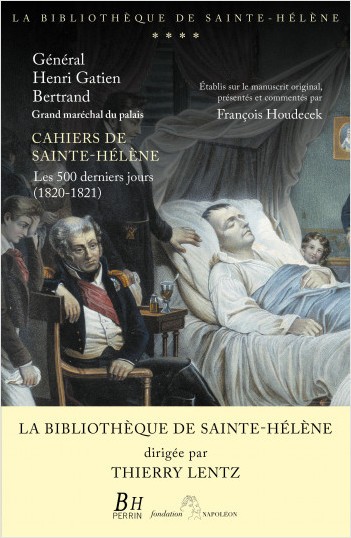napoleon.org – Over many years, you have been accustomed to the complex work of piecing together and deciphering Napoleon’s Correspondence. More recently, you’ve been pouring over General Bertrand’s “coded” notebooks made on St Helena, which he initially did not intend for publication but later considered more as a legacy to posterity. Can you tell us more about this “deciphering” work (in all senses of the term)?
François Houdecek – From April 1816, in other words before the departure of Las Cases [from St Helena], General Bertrand began to write down the conversations he had with Napoleon, and recorded the goings-on of the small colony in exile. Bertrand was accustomed to secrecy, having been Napoleon’s aide-de-camp, governor of the Illyrian Provinces, Grand maréchal du Palais and companion of the first exile (Elba) and the Hundred Days. In the context of St Helena, he was careful to conceal his written thoughts in order to avoid his precious notes falling into the hands of Governor Hudson Lowe.
But Bertrand did not write his notes in code strictly-speaking, as has been formerly suggested; he used a sort of short-hand which he thought only he was able to read. Words and names are reduced to their initials, and sometimes only the context of the sentence can give us the meaning of certain words! Beyond the words themselves, his sentence construction is also quite confusing! Bertrand uses no punctuation other than the semi-colon and the sentences run on endlessly. Bertrand’s Notebooks are in fact a series of notes copied end to end with no coherence other than chronology, although even dates are not always mentioned. However, he included memoranda which are very useful because they help to re-establish the chronology. It is not surprising that he never tried to publish his Notebooks during his lifetime, it would probably have driven him a scrupulous worker mad!
In the end, Napoleon’s nortorious handwriting and his correspondence were almost simpler to deal with!

napoleon.org – What is new about this publication compared to the first ‘complete’ edition of the Cahiers/notebooks, published in the 1950s [by Paul Fleuriot de Langle]?
François Houdecek – Paul Fleuriot de Langle did an immense job using the publishing methods of his time, but he did not reveal all of these. In particular, he did not mention that he had relied heavily on the transcriptions made by Ernest Razy, to whom Hortense Bertrand, daughter of the Grand Maréchal, had entrusted the task of publishing her father’s Notebooks.
My work involved correcting a number of small transcription errors, but above all adding Bertrand’s notes for the year 1820, which the previous edition had left out considering them too fragmentary.
Another difference between the two editions, is the change of tone. Bertrand wrote his notebooks in the same way that he had written the Mémoires sur la campagne d’Égypte [Memoirs on the Egyptian Campaign]. In other words, in Bertrand’s Notebooks, when Napoleon spoke, he never actually said “I” – as it appeared in the Fleuriot de Langle publication – but rather “Napoleon”, “the Emperor” or “he”… By this subsitution of the pronoun “I”, Fleuriot de Langle had given more life to the text but had given the impression that Bertrand was more of a confidant and friend of Napoleon, which he was not! At Longwood, Napoleon and Bertrand had maintained a very strong hierarchical relationship. The Grand Maréchal knew his place and, even if he sometimes took the liberty of arguing with Napoleon, he respected their professional relationship. His Cahiers are an expression of this.
napoleon.org – Bertrand has the reputation of being an unwavering devotee of the Emperor, right up to the latter’s last breath. Yet his actions were criticised by Napoleon’s own brother Joseph and by the Marquis de Montholon, his companion in exile. Are not the Cahiers/Notebooks more a sort of self-defence of the author than an account of the end of the Emperor’s life?
François Houdecek – Bertrand wrote his Notebooks on the spot and did not think that 20 years later anyone would try to question his attitude on St Helena. In his account, he noted everything, right down to the smallest detail, from the most unpleasant to the last flashes of imperial prose. You could say he was the registrar of St Helena!
It was not until the 1830s that the polemics began, led in particular by Montholon who wanted to appear as the most faithful of all the companions. But Bertrand never really got involved in the debate. He wrote several responses using his Cahiers as a reference but these responses never left his office. He only came out of his “reserve” in order to respond to criticism about the affair of Napoleon’s weapons, which he had kept after the death of the “Aiglon” in 1832. Napoleon had given them to Bertrand to give to his son. Bertrand was never able to accomplish his mission. He was the only one who knew that he himself would become the owner if he could not give them to the Emperor’s son, since Napoleon had confided this to him in the last days of April 1821. Joseph, believing himself to be the legitimate heir, demanded he hand them over, indeed a court case almost ensued. The controversy only died down when Bertrand offered the weapons to Louis Philippe at the time of the Retour des Cendres [the return of Napoleon’s mortal remains to Paris in 1840]. But throughout his defence, the Grand Maréchal drew on his memory and notes from St Helena.
napoleon.org – During your research on the Notebooks, did you discover any unsuspected personality traits in this protagonist of the huis-clos of St Helena, or on the contrary, were any caracteristics about him confirmed? Did he really have the “stiff upper lip” he is known for or did he have a hidden side to him?
François Houdecek – Bertrand had a strong sense of duty and loyalty, as well as an unbounded admiration for his Emperor. On St Helena, he was a consciencious man who constantly tried to keep himself away from jealousies and quarrels. It was he who often reasoned with the tempestuous Gourgaud! But this mentor-like attitude had a downside. It displeased Napoleon who, on St Helena, preferred more easy-going personalities such as those of Las Cases or Montholon.
Bertrand was very honourable but had an austere personality; he can’t have been very humourous or charming to be with! Because of this reserved nature and Madame Bertrand’s desire to leave, relations between the two men became cold and even icy during the last months of Napoleon’s life.
The personality of the Grand Maréchal contrasts greatly with that of his wife, Fanny Bertrand. Whilst she was very close to her husband, she also had a strong character, but was pretty, cheerful and dreamt only of worldly things.
napoleon.org – Bertrand’s cahiers/notebooks are famous for being the only traces written on the spot – minute by minute almost – by a direct witness of the Emperor’s death. What is the passage that most impressed you?
François Houdecek – The Emperor’s end is undeniably the most moving passage. Here we are at Napoleon’s bedside at Longwood, as he breathes his last. That passage is really gripping.
napoleon.org – Apart from Napoleon’s death, are there other extracts in these notebooks that you consider to be just as important, moving or unusual?
François Houdecek – The Cahiers/Notebooks are a compilation of notes for understanding Napoleon. Bertrand scrupulously noted the Emperor’s words and discussions. Napoleon spoke, Bertrand listened, occasionally argued, and sometimes relauched the conversation when the flow of imperial words dried up (which rarely happened!). As Napoleon’s illness progressed, this role was certainly more important than Bertrand – or even the Emperor – realised. What was most surprising to me was the “unfiltered” nature of this narrative. Whilst Bertrand did sometimes censor himself by crossing out certain passages (including a very famous one which I will leave to readers to discover!), these texts are as close as we can get to what Napoleon actually said. That, for me, is the strength of this text.


